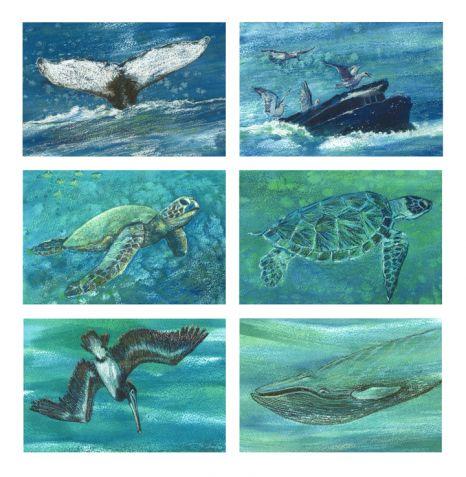
“Endangered Sea Creatures” by Elizabeth Leader, Mixed media
Sarah married a man who was building a boat to sail around the world. She loved that he was so intrepid, so exactly her idea of a man. She loved that, with John, her life wouldn’t be ordinary.
But it all went wrong the day they set out, into a fresh breeze and a glittering sea, as England thinned to a pencil line, and the sky turned to lead. She blogged about it afterwards; about how the wind built and the sea heaped up and a wave like a house slewed the boat and knocked her down; and how water fell on them like concrete and the sail seemed it would be buried forever but slow as a waterlogged bird it lifted somehow miraculously out of the sea.
She blogged about how they turned, and ran before the wind, and crawled back into Falmouth; how they tied up, and went into the cabin, and waded through bedding and floating food.
She didn’t blog about John, how she went to him to be held, and he was shaking, and instead she had to hold him. She didn’t blog about how, in the following days, and the following weeks, he seemed smaller. How she wanted to plump him up like a cushion, knock him back into being him.
“Hey,” Sarah said. “Everyone thinks we’re amazing.”
She read from her laptop. ‘“Omg you guys are awesome.” And this one. “You crazy sons of bitches. Totally mad – but bloody heroic.” And another. “Do it for me. Live the dream.”’
“Listen to them, John.”
He shrugged and looked away.
“Fine,” she said. “Whatever.”
The boat was cleaned up and ready again. John checked the forecast every day, but couldn’t make the decision to leave. So they shopped at Tesco, read their books, and slept. Sarah wanted to blog about the shrimp she found swimming in circles in the loo, but if she blogged, people would ask where they were. The shrimp stayed a day, then must’ve got bored, because he left. Other boats touched down like migrating birds, and left again, and every time another boat left, Sarah would look at her husband, to see if he saw how easy it was for other people.
John reached from his bunk one night and touched her arm. “Don’t be angry,” he said. When she knew he slept, she turned on her laptop and started to type.
‘Wending our way up a distributary of the Orinoco. The most amazing thing today–little fish swimming in the loo, shards of brilliant colour. Water hyacinths float past like carpets and the butterflies are half a foot across. We lie awake at night listening to the hoots, screeches and grunts from the jungle all around.”
She smiled. How her friends would envy her as they read her post over their cornflakes.
“Cheer up,” she said to John, next morning. “Things aren’t so bad. Why don’t we get a takeaway and a DVD tonight?”
She allowed enough weeks for a passage to the Pacific before she blogged again saying she had sat on a rock with a sunbathing iguana in the Galapagos. A few months later she told about their temporary work picking oranges in California. Then Alaska and she had them stepping onto a frosted deck into a morning so raw and brilliant it hurt. She told of an iceberg nearly hit and a blue whale passing like a submarine under their hull.
Back in Falmouth, England, when the winter gales blew, Sarah and John moved a little further upriver and tucked themselves somewhere snug, near a thatched pub which did cream teas, and a village shop.
“Check this before I post it?” Sarah said from her laptop.
John read over her shoulder.
“What?” she said. “What’s so funny?”
“We saw penguins in Alaska?”
Sarah stared at him, then knocked her head with the flat of her hand. “Stupid.”
John caught her hand in his. “You know what? I’m sick of ice and polar bears.”
“I am too,” Sarah said. “So where shall we go?”
“I’m thinking maybe … Hawaii? White beaches, palm trees, rum cocktails. If we catch the trade winds we could be there in no time. How does that sound?”
Margot Taylor lives near Taunton, UK, and works in her local library. Her short fiction has appeared in the Willesden Herald Prize anthology and online at Pulp.net, been performed at Liars’ League in London, and is forthcoming in Storyglossia.
Read an interview with Margot here.

Pingback: Interview with Margot Taylor | Rkvry Quarterly Literary Journal